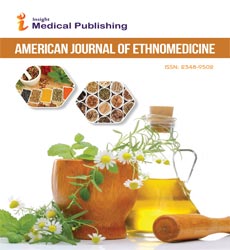ISSN : 2348-9502
American Journal of Ethnomedicine
Treatment of COVID-19 by Using Ethnomedicine
James Geurdes*
Department of Botany, University of Chinese Academy of Sciences, Beijing, China
- *Corresponding Author:
- James Geurdes
Department of Botany, University of Chinese Academy of Sciences, Beijing, China
E-mail: jamesgeurdes@gmail.com
Received Date: October 08, 2021; Accepted Date: October 14, 2021; Published Date: October 22, 2021
Citation: Geurdes J (2021) Treatment of COVID-19 by using Ethnomedicine. Am J Ethnomed Vol.8 No.9:004
Description
The occurrence of COVID-19 as a different disease in modern times has led the public to an original perception on health. In the early days of the COVID-19 pandemic, many factors led people to go their own way to find the "cure" they proposed. Specified the limited availability and limited access of traditional drugs, traditional drugs are becoming more eye catching due to their widespread availability and increased awareness of their safety. Some herbal medicines are thought to be able to relieve or cure COVID-19 and its symptoms. Similarities and arrangements in the use of herbal medicine show the knowledge of the disease and the local insight of each community regarding the treatment known as traditional medicine. Although the use of ethnomedicine has not yet been approved by regulatory agencies as the final guideline for COVID-19 management, the use of ethnomedicine has led to several herbal drug candidates with promising outcomes in the treatment of COVID19 increase. This article examines how society and its medical knowledge respond to new and ongoing illnesses, and whether this knowledge should be further explored to find cures for pandemics.
Traditional Treatment Methods
Due to the lack of resources of traditional modern medicine, people need to look for alternatives. One of them is Chinese herbal medicine. Despite some preliminary studies on the healing effects of available herbal medicines and COVID-19, such as the traditional herbal medicine Lianhua Qingwen, experts have found that misuse of such medicines is an unproven alternative. We are still afraid that relying on the suspicious efficacy of the drug can cause further harm to people. The World Health Organization's African Regional Office shared similar views on the use of traditional herbal medicine at COVID-19.
Though, traditional medicine is used as a knowledge base to "guide" the scientific community on the search for specific plant or herbal formulations, as patterns of similarity appear to the traditional medicines used for COVID-19 from plants. Herbal supplements
available worldwide. The ethnographic approach also makes it possible to present local wisdom and knowledge to the modern scientific community, giving that knowledge a scientific reputation and verification as a modern counterpart, further of undervalued knowledge.
Despite not being adopted yet into any clinical guidelines and, furthermore, being generally faced with uncertainty with conventional medicine experts (i.e, clinicians) perception is going on a positive trend and is generally improving. Several beneficial aspects of herbal medicine contribute to its current use and may be further used in clinical situations. The cultural proximity of ethnomedicine and its herbal consequent medicines also plays a significant role in its use. Firstly, despite being an ill-advised concept, the majority of people use herbal medicine with belief that its natural origin contributes to its safety. Furthermore, as contact to conventional medicine might be lacking in several circumstances, traditional medicine more specifically, herbal medicine serves as an alternative. Its traditional root uses readily available resources in each geographic area, making herbal medicine more widespread for the given area.
Traditional medicine has proven to be an area of exposure in medical knowledge. Its underestimation in the medical field today is a loss in terms of opportunity cost, as its benefits are hidden by the ongoing problems it faces. However, under the pandemic pressure of COVID-19, medicine is forced to adjust to original types of illness to that extent and problem.
Open Access Journals
- Aquaculture & Veterinary Science
- Chemistry & Chemical Sciences
- Clinical Sciences
- Engineering
- General Science
- Genetics & Molecular Biology
- Health Care & Nursing
- Immunology & Microbiology
- Materials Science
- Mathematics & Physics
- Medical Sciences
- Neurology & Psychiatry
- Oncology & Cancer Science
- Pharmaceutical Sciences
